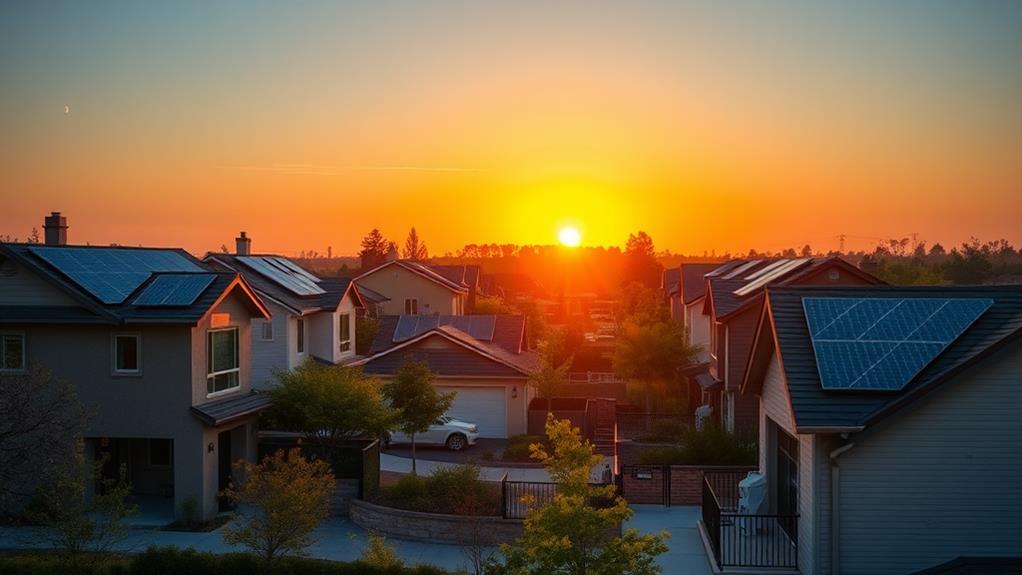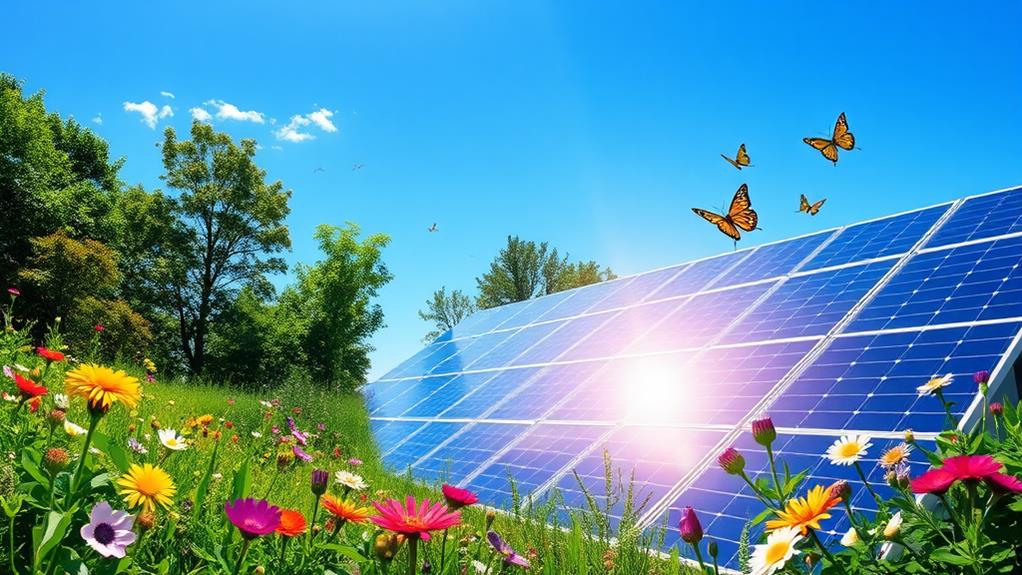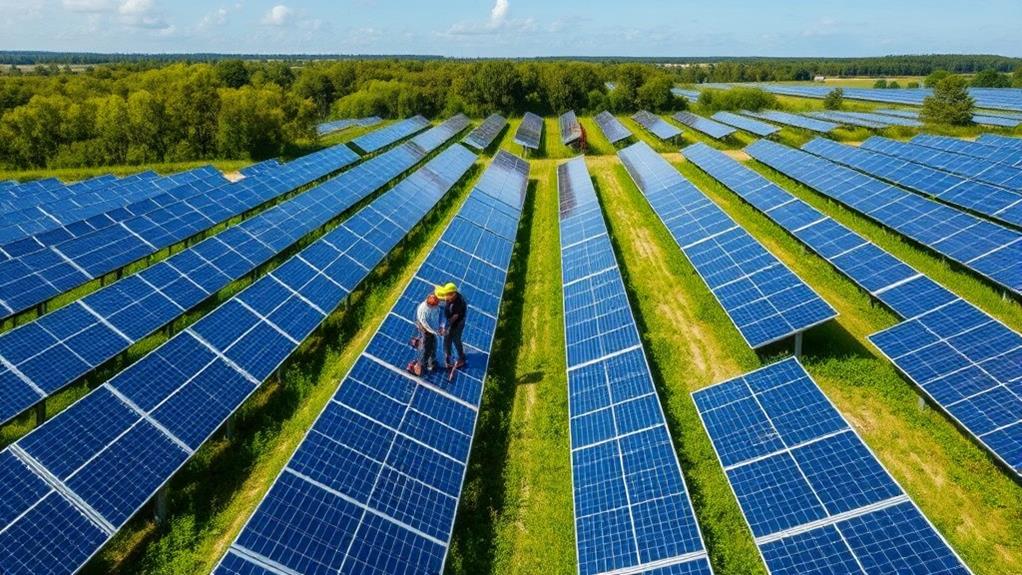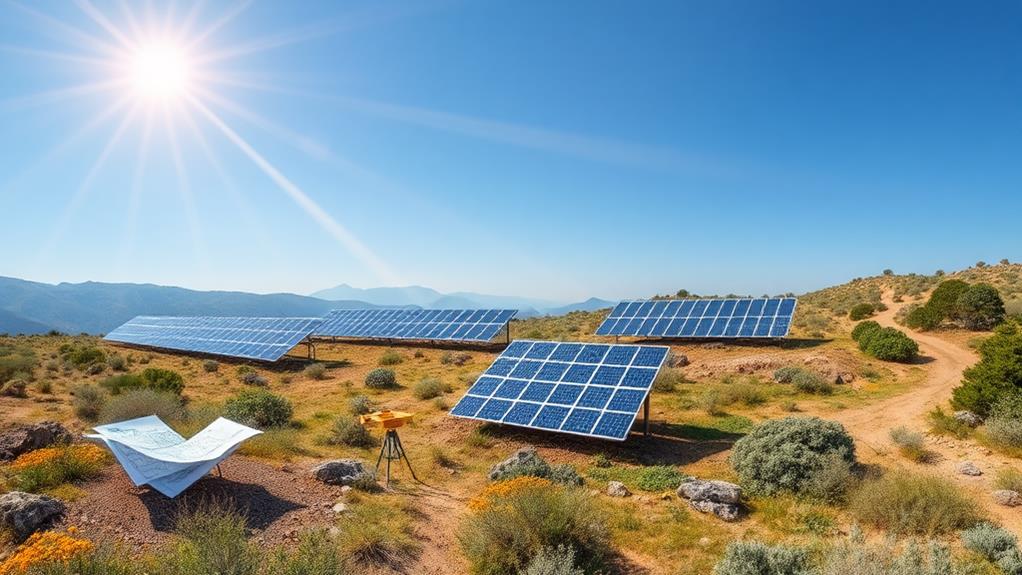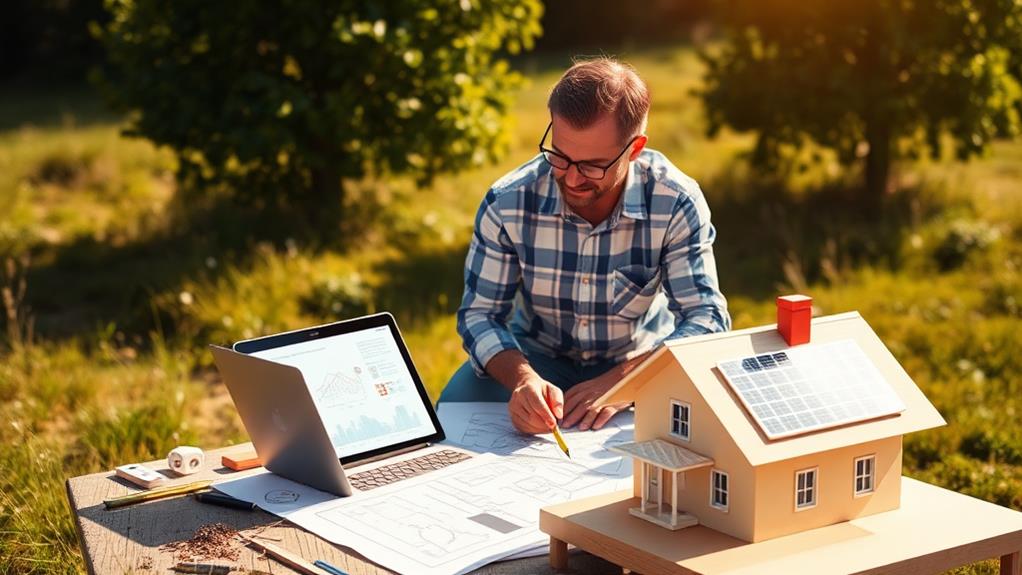Let's investigate solar setup for our residences, a decision that reduces electricity expenses by up to 50% while backing renewable energy and boosting property worth. Expenses rely on elements such as system magnitude and position, but federal tax deductions and state perks can make it more viable. Collaborating with specialists guarantees roof suitability, whether it's asphalt shingles or tiles. Correct setup boosts energy generation, and choices like solar financing aid in controlling expenses. Regular upkeep prolongs panel lifespan, optimizing effectiveness and guaranteeing long-term savings. By comprehending each facet, we unleash the potential of solar power for a more eco-friendly lifestyle.
Key Takeaways
- Solar panels reduce electricity bills and increase home value by harnessing renewable energy.
- Installation costs depend on system size, location, and roof type.
- Federal tax credits and state incentives make solar installations more affordable.
- Professional installation ensures optimal panel orientation and system efficiency.
- Regular maintenance and cleaning boost the longevity and performance of solar systems.
Understanding Solar Energy Benefits
When considering the advantages of solar energy, it's evident how it can significantly influence our lives. Harnessing solar power allows us to utilise renewable energy, which not only reduces our carbon footprint but also ensures long-term savings. Installing solar panels on residential properties decreases electricity bills and can enhance a home's value. This move towards energy independence reduces reliance on traditional power grids, providing a reliable backup during outages.
The benefits of solar energy extend further. Federal tax credits and state incentives reduce initial costs, making solar installation more feasible for homeowners. Professional installers are crucial, evaluating a home's suitability for solar panels based on factors like roof condition and sunlight exposure. Their expertise maximises the benefits of solar investment.
Specific examples of high-quality solar panels include the LG NeON H and the SunPower Maxeon 5, both known for their efficiency and durability. These options ensure optimal energy production even in less favourable weather conditions, offering great returns on investment.
Evaluating Installation Costs
While the advantages of solar energy are apparent, understanding the costs associated with its installation is vital for making an informed choice. Many aspire to be part of a community that values sustainability and energy independence, and knowledge of solar installation costs aids in taking that step.
The initial investment in South Africa can range significantly, influenced by factors such as home size, location, and system size. Larger homes or those situated in regions with abundant sunlight might necessitate more substantial systems, affecting the overall expense.
The initial expenditure generally covers labour, permits, equipment, and the requisite paperwork to commence the process. It's important to remember that these upfront costs are only one aspect of the financial commitment.
Long-term expenses, including maintenance and occasional cleaning, are necessary to ensure systems operate efficiently.
Considering the potential return on investment, solar panels can provide savings on utility electricity costs, which could eventually balance out the initial outlay. Evaluating these elements carefully allows for a decision that supports a sustainable and financially prudent future.
For example, SunPower Maxeon 5 panels are known for their high efficiency and durability, ideal for those seeking long-term performance.
Choosing the Right Roof Type
Selecting the appropriate roof type is crucial when planning a solar panel installation. Within a community focused on sustainable energy, it's important to consider how different roof types affect the efficiency and installation of our solar systems. Asphalt shingles, metal roofs, and concrete tile roofs are among the best options for solar panels due to their durability and compatibility. These roof types offer unique benefits that optimise sun exposure and enhance energy savings.
Flat roofs are also suitable for solar panels. With the right mounting systems, maximum sun exposure can be achieved, ensuring optimal performance of the solar panels. However, caution is needed with tile roofs as they require additional expertise to prevent damage during installation.
Partnering with experienced solar contractors is essential in this decision-making process. They can guide in selecting the most suitable roof type for specific needs, while keeping costs in check. Collaboration ensures a seamless solar installation and strengthens community commitment to renewable energy. Let's make informed choices and build a sustainable future together.
Configuring Your Solar System
Configuring your solar system is an essential step to ensure you maximise your investment. First, determining the ideal solar system size is crucial. Consider your energy needs and available roof space to ensure your residential solar installation is both efficient and cost-effective.
Orientation and tilt angle of the solar panels play a significant role in energy production. Maximising sunlight exposure enhances energy savings. Depending on your property layout, choose between rooftop or ground-mounted solar panels. Rooftop panels are ideal for limited space, while ground-mounted panels offer flexibility in orientation.
Opting for premium solar technology ensures long-term reliability and efficiency. For example, consider SunPower's Maxeon solar panels, known for their high efficiency and durability. Consulting with solar professionals is invaluable. They guide you in customising your system design and configuration, ensuring optimal performance tailored to your specific needs.
Thoughtful system configuration creates a solar solution that meets your energy goals and fosters a sense of community and shared purpose.
Financing and Incentives Options
Investigating financing and incentive options is essential for making solar installation affordable and accessible for homeowners. Our community is committed to sustainable living, and understanding solar financing aids in making informed decisions.
The Federal tax credit, which covers 30% of system costs, has been extended through the Inflation Reduction Act until 2032. This significant saving makes solar energy more attainable. Solar loans, leases, or Power Purchase Agreements (PPAs) allow the costs to be spread out, avoiding the burden of large upfront expenses.
State and utility rebates further alleviate financial strain, often differing based on location. These incentives can considerably reduce initial costs, making solar a viable option for more families. For precise information, the DSIRE website is an excellent resource, offering up-to-date details on available incentives and rebates tailored to specific locations.
In addition to these, solar panel options like the LG NeON 2 and Panasonic HIT are worth considering for their efficiency and performance.
Navigating Local Regulations
Understanding local regulations is just as crucial as financing and incentives when considering solar installations. When planning to fit solar panels on our homes, knowledge of local building codes and regulations is essential. Each city or county has unique permit requirements and zoning restrictions that could affect our project. These may influence aspects such as panel placement, size, and how we connect to the grid.
Non-compliance with these local regulations can result in fines or the removal of the solar panel system. To avoid these issues, consulting local authorities for the latest information on city regulations is advisable. This ensures that our installation is compliant from the outset.
Partnering with a professional solar installer familiar with local regulations is beneficial. They guide us through the regulatory compliance process and help ensure a smooth installation. This not only helps us adhere to local building codes but also provides peace of mind, knowing our solar project is legally sound. Adopting this approach strengthens our community's commitment to sustainable energy.
Installation Process Overview
Embarking on the solar installation journey involves several key steps that we should understand to ensure a successful setup. Let's look at how our solar panel system comes to life. The installation process usually takes 1-3 days, depending on the system's size. Professional installers manage everything for us—from obtaining necessary permits to final inspections, ensuring we're in capable hands.
Once permits are sorted, they proceed with the equipment setup, carefully handling the solar panels. Whether our preference is rooftop mounting or ground-mounted systems, they use reliable racking equipment to secure the panels. This step is crucial for safety and efficiency, ensuring our system withstands the test of time.
The inverter, a vital component, is installed to transform solar energy into electricity for our use. Monitoring equipment is set up to track energy production and ensure optimal system performance. Products like the SolarEdge HD-Wave inverter are recommended for their efficiency and reliability. This setup enables us to feel confident in our energy savings.
Maintenance and Longevity Tips
Let's discuss how we can maintain our solar panels in excellent condition and guarantee they last for decades.
By consistently cleaning the panels, we can enhance their efficiency by up to 20%. Monitoring system performance helps us detect any issues early.
Furthermore, contemplating professional maintenance and planning for inverter replacements every 10-15 years will optimize energy production and extend the system's lifespan.
Routine Cleaning Practices
Maintaining clean solar panels is essential for optimising their efficiency. Ensuring panels are free from dust, grime, bird droppings, and pollen allows them to function at their best. Clean panels enable us to utilise excess solar energy more effectively, boosting overall energy output.
Regular cleaning can enhance energy efficiency by up to 30%, significantly improving performance. Neglecting this can diminish solar panel output, affecting the return on our investment.
Panels can be maintained using a soft brush, mild soap, and water for gentle cleaning. Cleaning frequency should be adjusted to specific conditions, taking into account factors such as location, weather, and the tilt angle of the panels.
For those preferring a hands-off approach or seeking comprehensive maintenance, professional cleaning services are a valuable option. They can help maintain optimal solar panel output and prolong the system's lifespan.
Consider using products like the EcoFlow Solar Panel Cleaning Kit, which includes all necessary tools for effective maintenance. This kit ensures thorough cleaning without causing damage, making it a wise choice for solar panel upkeep.
Optimal Panel Performance
To ensure our solar panels function at their utmost efficiency, it's essential to adopt a proactive approach to their upkeep. Cleaning them regularly is crucial; dirt and debris can decrease efficiency by as much as 25%. Maintaining clean panels guarantees optimal performance and energy production.
Checking for shading caused by trees or nearby structures is vital as it can affect panel performance throughout the day.
Online monitoring tools can assist in tracking the solar system's performance. These tools help identify and rectify issues promptly, ensuring panels consistently function at their best.
It's advisable to schedule professional maintenance every 1-2 years. Skilled technicians can identify potential problems and optimise the system for peak performance and longevity.
Investing in high-quality panels with a robust warranty further secures their lifespan. A reliable warranty provides peace of mind and ensures panels remain efficient over time.
Taking these steps fosters a sense of community among solar enthusiasts as we collectively aim for sustainability and support each other in maximising our solar investments.
System Longevity Strategies
Maintaining the durability of solar setups relies on consistent and proactive maintenance practices. We all wish for our solar systems to endure, offering clean energy and fostering community pride. Regular cleaning of solar panels is essential. Dust and debris can reduce system efficiency, so keeping them spotless ensures optimal energy conversion and extends the lifespan of the solar system.
Monitoring energy production is a critical aspect. Keeping a close watch on system performance allows for early identification of potential issues, enabling timely maintenance before they escalate. Inverter maintenance is equally vital, as the inverter is crucial for converting solar energy into usable electricity. Regular checks can prevent energy conversion problems and sustain overall system health. The Fronius Primo inverter is a reliable choice for efficient energy conversion.
Attention should be paid to shading from nearby trees or structures. Shading can significantly affect efficiency, so addressing it can prevent long-term losses.
Scheduling professional inspections at recommended intervals provides peace of mind, ensuring solar setups remain in prime condition. Reputable companies like SolarEdge offer inspection services that can aid in maintaining system performance.
Conclusion
In conclusion, we've explored the details of residential solar installations, highlighting the benefits and key considerations. By examining costs, choosing the right roof, and installing your system, you're moving towards a sustainable future. Be sure to look into financing options and comply with local regulations to make the process smoother. After installation, regular maintenance will ensure your system lasts. Let's embrace solar energy and make a positive impact on our environment and energy bills.
If you have any questions about our products like Rail-Less Solar Brackets, End Spacers, Structural Brackets, Ground Mounted Solar Systems, Corrugated Brackets, and Earthing Plates, or our services such as the DeoSizer Tool, Evaluation and Design, Maintenance and Support, and Solar Installations, please feel free to contact us at Deo Solar. We're here to help!

